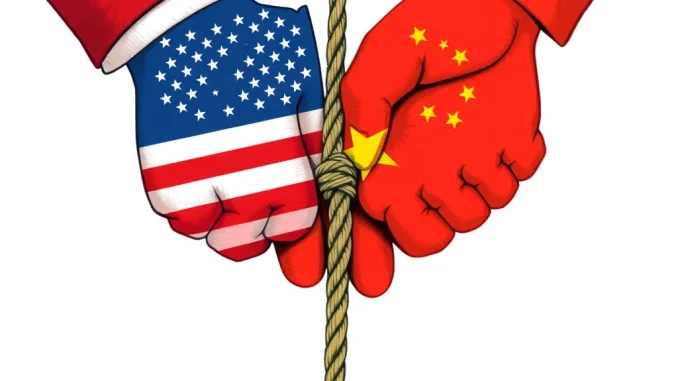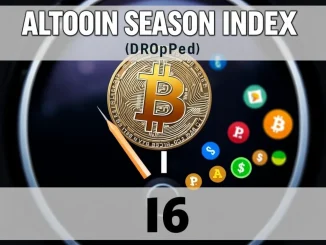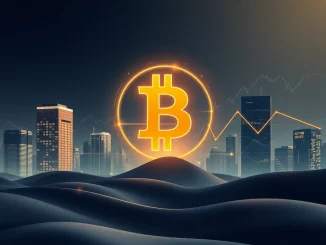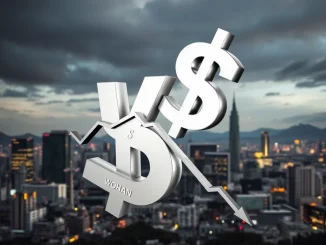
In the interconnected world of global finance and trade, shifts in policy can send ripples across markets, including the volatile realm of cryptocurrencies. A recent statement from a prominent figure has captured attention, suggesting a potential change in the economic landscape that could have wider implications. Howard Lutnick, the CEO of BGC Partners and Cantor Fitzgerald, reportedly stated that the current pause on China Tariffs is unlikely to be extended. This perspective, shared via Solid Intel on X, points towards a possible recalibration of trade relations between two of the world’s largest economies.
What Did Howard Lutnick Say About China Tariffs?
According to reports circulating, Howard Lutnick, a well-respected voice in financial circles, has offered a pointed observation regarding the ongoing trade situation with China. His reported statement indicates a belief that the temporary cessation of certain tariffs imposed on Chinese goods by the United States is nearing its end. This isn’t just a casual comment; coming from someone at the helm of major financial institutions, it carries weight and reflects insights into potential governmental or economic policy directions.
Understanding the context is key:
- The US previously imposed significant tariffs on a wide range of Chinese imports.
- These tariffs were part of a broader strategy during the US-China Trade War.
- A ‘pause’ or specific exemptions have been in place for some time, offering temporary relief to businesses and consumers.
- Lutnick’s view suggests this period of relief is expected to conclude.
Understanding the US-China Trade War Context
The phrase US-China Trade War refers to the period starting roughly in 2018 when the US and China began imposing tit-for-tat tariffs on each other’s goods. The stated goals varied, including addressing trade imbalances, intellectual property theft concerns, and market access issues. While the most intense phase has passed, the tariffs largely remain in place, with specific goods or sectors sometimes receiving temporary exclusions or ‘pauses’.
The current situation isn’t a complete absence of tariffs, but rather a targeted pause on certain items or a delay in implementing new ones. Lutnick’s comments imply that the political and economic conditions that allowed for this pause may be changing, leading to a potential reinstatement or expansion of tariffs.
Potential Impact on the Global Economic Outlook
The end of a tariff pause and a potential re-escalation of trade tensions could significantly influence the Global Economic Outlook. Tariffs act as taxes on imported goods, making them more expensive. This can lead to several consequences:
- Increased Costs: Businesses relying on imports from China face higher expenses, which may be passed on to consumers as higher prices (inflation).
- Supply Chain Disruption: Companies may need to find alternative suppliers outside of China, a process that can be complex, costly, and time-consuming.
- Reduced Trade Volume: Higher costs can decrease the overall volume of goods traded between the two countries.
- Investor Uncertainty: Geopolitical and economic tensions create uncertainty, which can lead investors to become more cautious, potentially impacting stock markets and other asset classes.
These factors collectively contribute to a less predictable and potentially slower global economic environment.
What Could This Mean for Crypto Market Impact?
While tariffs on physical goods might seem unrelated to digital assets, the Crypto Market Impact is often tied to broader macroeconomic trends and investor sentiment. Cryptocurrencies, particularly Bitcoin, are increasingly viewed within the context of the global financial system.
Here’s how renewed trade tensions could matter for crypto:
- Risk-Off Sentiment: Increased global economic uncertainty or trade disputes can trigger a ‘risk-off’ mood among investors, leading them to move away from assets perceived as higher risk, which can include cryptocurrencies.
- Inflation Hedges: Conversely, if tariffs lead to significant inflation in Western economies, some investors might view assets like Bitcoin as a potential hedge against rising prices, similar to gold.
- Economic Slowdown: A slowdown in the global economy due to trade friction could reduce overall liquidity and investment capital available for riskier assets like crypto.
- Currency Fluctuations: Trade tensions can impact fiat currency exchange rates, which can indirectly influence the flow of capital into and out of crypto markets, especially in regions heavily involved in the trade dispute.
Therefore, a shift in tariff policy, as suggested by Howard Lutnick, is a factor worth monitoring for anyone invested in or following the crypto space.
Navigating Potential Economic Headwinds
Given the potential for shifts in China Tariffs policy and the resulting impact on the Global Economic Outlook, what can investors and market participants consider?
- Stay Informed: Keep track of official announcements regarding trade policy from both the US and Chinese governments.
- Assess Risk Tolerance: Understand how potential economic volatility aligns with your personal investment strategy and risk appetite.
- Diversification: Ensure your portfolio is diversified across different asset classes, which can help mitigate risks associated with specific economic shocks.
- Long-Term View: For crypto investors, focusing on the long-term potential of blockchain technology and specific projects, rather than reacting to short-term macroeconomic noise, is often a prudent approach.
The views expressed by figures like Howard Lutnick serve as indicators of potential future economic conditions, prompting market participants to evaluate their positions and strategies.
Summary: Preparing for Potential Tariff Changes
Howard Lutnick’s reported statement suggests the temporary halt on China Tariffs may soon end, potentially reigniting aspects of the US-China Trade War. This development could introduce new variables into the Global Economic Outlook, impacting supply chains, inflation, and overall market sentiment. For those in the crypto space, understanding this potential shift is important, as global economic conditions often have a significant Crypto Market Impact. While the future remains uncertain, staying informed and considering potential economic headwinds is key to navigating the complex interplay between global trade policy and financial markets.



